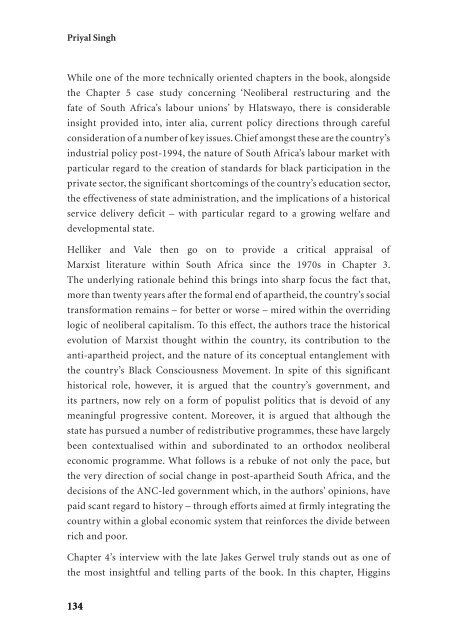ACCORD-ajcr-2015-1
ACCORD-ajcr-2015-1
ACCORD-ajcr-2015-1
- No tags were found...
Create successful ePaper yourself
Turn your PDF publications into a flip-book with our unique Google optimized e-Paper software.
Priyal Singh<br />
While one of the more technically oriented chapters in the book, alongside<br />
the Chapter 5 case study concerning ‘Neoliberal restructuring and the<br />
fate of South Africa’s labour unions’ by Hlatswayo, there is considerable<br />
insight provided into, inter alia, current policy directions through careful<br />
consideration of a number of key issues. Chief amongst these are the country’s<br />
industrial policy post-1994, the nature of South Africa’s labour market with<br />
particular regard to the creation of standards for black participation in the<br />
private sector, the significant shortcomings of the country’s education sector,<br />
the effectiveness of state administration, and the implications of a historical<br />
service delivery deficit – with particular regard to a growing welfare and<br />
developmental state.<br />
Helliker and Vale then go on to provide a critical appraisal of<br />
Marxist literature within South Africa since the 1970s in Chapter 3.<br />
The underlying rationale behind this brings into sharp focus the fact that,<br />
more than twenty years after the formal end of apartheid, the country’s social<br />
transformation remains – for better or worse – mired within the overriding<br />
logic of neoliberal capitalism. To this effect, the authors trace the historical<br />
evolution of Marxist thought within the country, its contribution to the<br />
anti-apartheid project, and the nature of its conceptual entanglement with<br />
the country’s Black Consciousness Movement. In spite of this significant<br />
historical role, however, it is argued that the country’s government, and<br />
its partners, now rely on a form of populist politics that is devoid of any<br />
meaningful progressive content. Moreover, it is argued that although the<br />
state has pursued a number of redistributive programmes, these have largely<br />
been contextualised within and subordinated to an orthodox neoliberal<br />
economic programme. What follows is a rebuke of not only the pace, but<br />
the very direction of social change in post-apartheid South Africa, and the<br />
decisions of the ANC-led government which, in the authors’ opinions, have<br />
paid scant regard to history – through efforts aimed at firmly integrating the<br />
country within a global economic system that reinforces the divide between<br />
rich and poor.<br />
Chapter 4’s interview with the late Jakes Gerwel truly stands out as one of<br />
the most insightful and telling parts of the book. In this chapter, Higgins<br />
134


